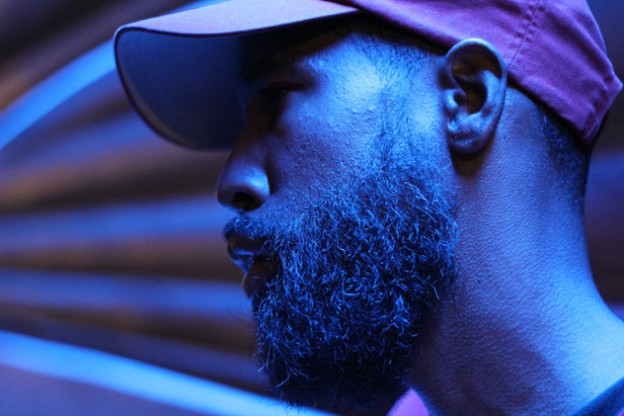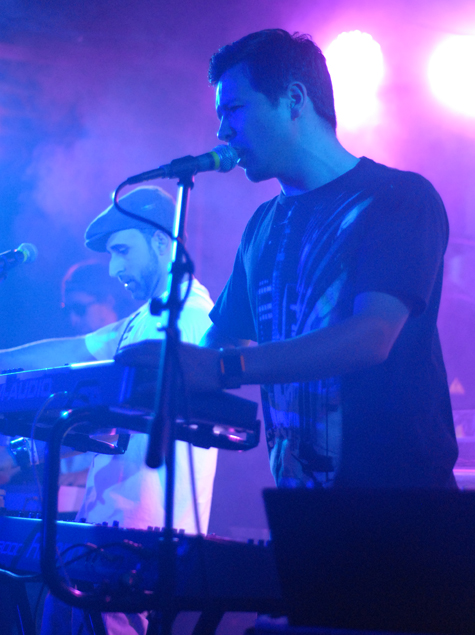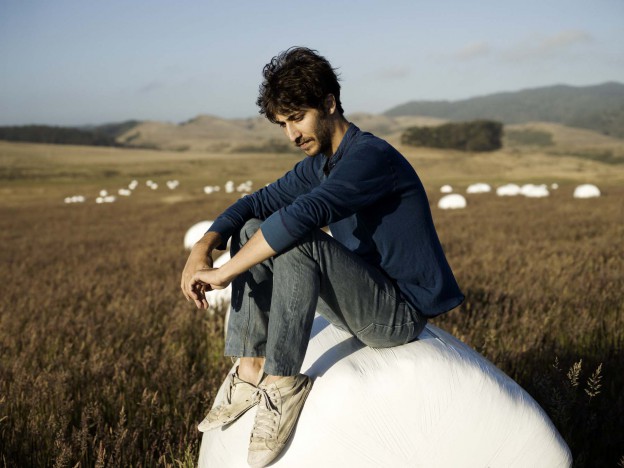A rose by any other name may smell as sweet, but in the case of Astronautica’s new album Gemini, the name is exactly perfect. The album contains the ideal grooves for strapping on headphones and blasting through the stars, or—as the artist behind Astronautica, Edrina Martinez, recommends—listening to while “driving down the coast, chilling on a beach or in the desert somewhere drinking a beer or smoking a joint. Just going somewhere where you can take a break without any deadlines or anything and really chill.”
The bouncing single “Palm Springs” is bathed in a deep golden haze of washed-out dance parties by the pool, as the synths and the soft, love-struck vocals of Martinez slowly drift by. The drums are punchy and the resulting mix sounds like what would happen if Nosaj Thing and Emancipator conceived a musical love child while stoned in a planetarium.
Martinez is a Los Angeles native who discovered the notorious club Low End Theory at the ripe age of 18 and instantly fell in love. “Yeah I would go into the bathroom with these big black Xs on my hands and try to wash them off,” Martinez said. “But just being there was so different, like the sound was really big and you were packed in with all these people. You feel like you’re one with the music and the artist just because of the proximity.”
It wasn’t long before Martinez was learning Ableton mixing software through YouTube tutorials, using her guitar to make samples and coming up with something different from anything else coming out of the L.A. beat scene at the time. She put some songs up on her Soundcloud and was approached by Daddy Kev, founder of Low End Theory, to make an album. Then she was touring the United States, getting tweets from Tokimonsta and playing Coachella.
“Coachella was frickin’ crazy because I’ve been going since I was 14, so it was such a trip to be on the other side of everything,” she said, before going into her experiences from the second weekend at the festival’s Turn Down tent. “That was where everyone came down from whatever they were on; people laying down on blankets and massaging each other. I was like, man, I kinda want to be on that side again.”
However, it’ll likely be a long time before Martinez will be able to retire to the cuddle puddles considering the amount of jams she’s been able to produce in the few short years since posting her early demos on Soundcloud. She’s collaborated with and remixed a variety of different artists through the music collectives springing up around Low End Theory. Collaborating with JMSN for “How It’s Gonna Be,” and Bridge for “Velvet Morning,” Martinez showed that she could ground her music and make some slinky R&B bangers when she wanted to. Martinez grew up surrounded by hip-hop and purportedly the first song she ever sang was Snoop Dogg’s “Gin and Juice,” so it makes sense that there’s a little hint of pride when she talks about the collaborations.
But for Gemini, her second album, Martinez decided to go in a different direction. For about half of the album, she’s sampling her own voice, and writing her own lyrics instead of using other people’s samples.
“I think having that challenge and pushing myself made the album more exciting to me,” she said. “I wanted to make myself more vulnerable and put myself out there a little more.”
And there is a certain amount of intimacy in Gemini which is a bit harder to find in electronic music. Martinez describes the album as a love story; falling in love, falling out of love and falling in love again, like cyclical phases of the moon or the tides in the sea.
The hooks are breathy declarations like, “I’m not afraid / To fall in love again,” and “I still think of you / Do you still think of me?” They’re small, simple hooks, but they’re smooth. Yet for as ethereal and shimmering the songs can be, they’re still grounded in a setting that is very near and dear to Martinez: Palm Springs.
“It’s just a place where I can go away for the weekend and get away from everything and just hang out with the people I like and love the most.” Martinez said. “I love being in the desert, the poolside or whatever, the warmth of the sun. Palm Springs for me is just a very romantic place.”
For Martinez, Palm Springs is tied up with memories of leaving L.A. with her mother, or high school friends, or a boyfriend, and it was this universal feeling of love that she was trying to get across to the listener. Sadly, some fans have taken this sentiment too far, and like Lauren Mayberry of CHVRCHES, she’s had to shoot down some marriage proposals.

“For the most part I think fans are really respectful, but I remember that’s the question I’d be getting constantly on Tumblr,” she said. “Marriage proposals, yeah, those are real, they happen a lot. Then this other time I was on stage, and out of nowhere someone was like ‘Show us your tit!’ Like, just one?… I don’t know, I just try to focus on the music.”
Martinez went on to say that while she mostly just laughs it off now, she’ll get back to me after her upcoming tour if the cat-calling really begins to drive her crazy. But in the meantime, she’s getting back to the music. Martinez is currently designing an all-live show with new visuals and live instrumentation.
“I’m trying to play 100 percent all original music while still playing with the MIDI controller and the guitar. Navigating through those waters is exciting but definitely a journey. In my DJ set, I’m there to make people dance and whatnot, but for the live set it’s more just the vibes.”
Astronautica will be embarking on a tour of the west coast with fellow Alpha Pup Records bands and serving up those tasty vibes on June 19 at Sol Collective in Sacramento. Past that, Martinez is looking forward to touring Europe and presumably conquering the world after that.
“I wanna play anywhere, I think it’d be cool to play in Paris or something,” she said. “Maybe like a larger venue at night with a big DJ set, but then I also would want to play at the Philippines, or somewhere really tropical, and do like an outdoorsy day time thing as a live set with my guitar. I don’t know, can I get back to you on that?”
With the amount of buzz circulating around Astronautica, it seems like the sky is only the first stop for this young rocketeer.
Check out Astronautica as part of the Alpha Pup Summer Tour 2016 on June 19, 2016, at Sol Collective, located at 2574 21st St in Sacramento. This all-ages show kicks off at 9 p.m. and also features Gypsymamba, Elusive, Toy Light, Mr. Dibiase, Tel Cairo, Khmestri and more to be announced. Find more info online at Facebook.com/SolCollective.
His Life’s Work
There is little escape from the sun at 3rd and Adeline in Oakland. The industrial district is flooded with bodies sweating through T-shirts and bucket hats designed with variations of the three-eyed smiley face symbol of local rap legends Hieroglyphics. The crew is celebrating its fourth annual Hiero Day and among the invitees to perform is Sacramento’s Dibia$e. It seems as though a combination of the heat and the liberal weed smoking reduces crowd participation to a steady head nod that ripples to the signature bounce of Dibia$e’s production.
Although other producers will grace the stage with the same gear at Hiero Day, none manipulate the SP-404 like Dibia$e. His production is glitchy with hints of chiptune and 8-bit, at other times soulful samples finessed with a slice that’s both Dilla-esque and entirely a style all his own.
On this afternoon in Oakland the hundreds gathered don’t move much, but they also don’t leave. Break dancers accompany Dibia$e on stage, stepping to his music and interpreting the rhythms with their moves. It’s almost as though he’s got the remote control over their movement. We are high and in awe. He’s a veteran as much as headliners like Aceyalone and Tha Alkaholiks, but he’s also remained a low-key legend that’s been present at every significant scene in Los Angeles and makes no qualms about his quiet life in Sacramento.
Days prior to Hiero Day, I met Dibia$e at Sol Collective south of Broadway in Sacramento. He was there to record a session with a local artist, but the person had bailed last minute. As we were sitting in a side room tracking the timeline of his career, he said he liked Sol Collective because it reminds him of Good Life Café in Leimert Park, Los Angeles. In the ‘90s, Good Life, a raw food restaurant by day and the rawest open mic by night, was the event for independent rappers in Leimert Park. At Good Life, if you didn’t meet their standards, attendees shouted “pass the mic,” forcing you out of contention until next week. It was in competition at Good Life, later called Project Blowed, that he first earned his stripes as a rapper and later as a producer in beat battles. Dibia$e said once he got behind the sampler to make beats, it became his MO because his friends were always in need of them, and, from winning the battles, he got his first experience paying rent off rap music.
“It was stressful because I had to win like a prizefighter,” he said. “I was the Kimbo Slice on beats.”
From the early 2000s until 2007, Dibia$e was notorious in the California beat battle circuit. His competition at Project Blowed was against burgeoning artists like Nosaj Thing and TOKiMONSTA that prepared him for greater West Coast scene. When he wasn’t competing, he met with L.A. producers like Flying Lotus, Ras G, Kutmah and Exile at a beat workshop called Sketchbook at The Room in Hollywood—a precursor to the now-legendary Low End Theory at the Airliner. In those days, he’d take Greyhound buses to the Bay Area and drive to San Diego for battles. Venues like The Knitting Factory L.A. hosted Beat Society and the Red Bull Big Tune Beat Battles. He would even travel to the Inland Empire for battles in Riverside.
“Even when I’d go to watch, people would come up to me nervous to find out if I was entering,” he said.
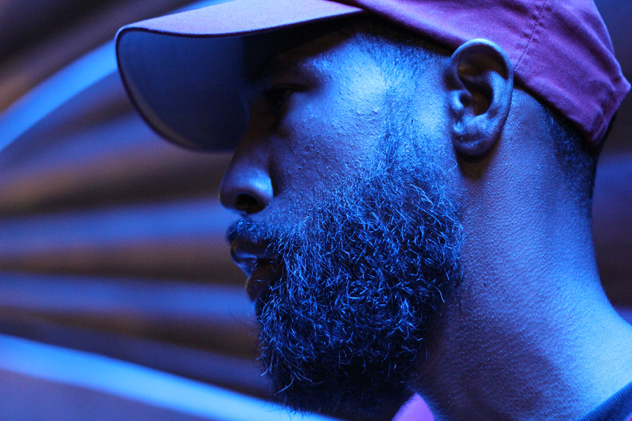
He was making do from battling, but concurrently, the admiration for beat music was no longer exclusive to the small producer community. Sketchbook was conceived as a workshop to sit around a boombox and trade beat tapes like baseball cards. Low End Theory was a social event where people went to be scene and photographed; and where musicians like Erykah Badu, Thom Yorke, and Prince came to DJ secret sets. As Low End Theory took off and an arena for beatmakers outside the battle circuit became a reality, his associates from Sketchbook thought he should think big picture.
“A lot of cats used to tell me to leave the battles alone and start doing the shows,” he said. “But I felt like the battling was my market. It got me traveling. I rode that wave for a little bit. I didn’t win every single one. I’d drive far and lose battles. Lose in the finals after going four extra rounds and just miss it. Out $500 after getting that close. That’s rent money.”
In 2010 he was still competing in battles, winning the Los Angeles Big Tune event but falling short in the finals in Chicago, but that big picture was also coming into focus. He released his first solo album, Machines Hate Me, on L.A.-label Alpha Pup, run by Low End Theory mastermind Daddy Kev. That year was also when Dibia$e uprooted from L.A. to close the distance on a relationship with a woman from Sacramento. The move paid dividends. She’s now his booking agent, business partner with their label 10 Thirty Records, wife and mother of his newborn daughter.
While Sacramento did not offer the scene support he enjoyed in L.A., he expressed no regrets in his current status. His fatherhood role, which includes a stepson, structures his time spent making music. As a young producer, he would hole up in a friend’s studio and work in a weekend flurry. Now his lab time in a studio built in the backyard is reduced to a few hours during his daughter’s afternoon nap, the baby monitor at his side by the sampler.
“I can’t squander the day away,” he said. “I’ll play with her and stimulate her brain for a little bit. Sometimes she’ll sit in the lab with me, and I’ll play her some music. Put her to sleep. She sleeps for two hours. I knock some beats out a little bit. I’ll hear her on the monitor. She’s waking up and I’ll feed her again.”
To his stepson and the 6th grade hoop dreamers of California Youth Basketball League in Natomas, he’s Coach Dibia$e. He’s been a youth coach and participated in community volunteer work since his L.A. days and while he only played a year in high school, basketball was a passion growing up in Watts. He said he would play “sunup to sundown” on the public courts growing up. As Coach Dibia$e, his team struggled but competed admirably enough in the first season to maintain his position on the bench.
“I wasn’t going to do it again, but most of the kids requested me to come back,” he said. “They saw the improvement. The last four games we were close to winning all of them [let’s out a big sigh] … but didn’t. That’s that stress part I didn’t miss. But seeing those kids having fun makes it rewarding.”
He admits Sacramento is conducive to creative productivity in its lack of distractions. It shows in his output of three albums (Sound Palace, Looney Goons and Schematiks) in four years as well as several smaller Bandcamp releases. Here he’s lesser known, but his connections to Low End Theory continue to yield opportunities like shows in Australia and Japan. “The time flies,” he said. “It’s only felt like a few months, but it’s going on five years.”
On the horizon is his set at TBD Fest on Friday, Sept. 18, 2015, and more projects with greater ambition, still thinking big picture.
“I’m planning to work with more rappers this year,” he said of his plans for the future, one of which includes aspirations for a project with Detroit rapper and Stones Throw artist Guilty Simpson. Locally he’s got work completed with Chuuwee, Rufio, Wise Child and Tel Cairo.
Still, when he graces that stage, the heart of his life’s work is at his fingertips. The SP-404 is designed to be portable, weighing only 2 pounds, 14 ounces, and he carries his in a shoebox decorated with stickers of the labels who have released his records. His appreciation for the life he leads is in those details on that shoebox. During his Hiero Day set he remixes Souls of Mischief, while sporting a red T-shirt that reads “‘93 Til.” Only days prior he expressed his decades of admiration for the Hiero crew dating back to his drawing days, and that being on that stage was a bucket list item.
“Going back to my junior high days I used to draw cartoon characters of like Hieroglyphics and Souls of Mischief, all them cats,” he said. “That’s the homies and shit now … if they would have told me I would be kicking it with some of these cats in ‘93, I’d have been like yeah right.”

Dibia$e is a must-see artist gracing the stage at this year’s TBD Fest, which will be held in the Bridge District in West Sacramento. For more tickets and lineup info, go to Tbdfest.com. Dibia$e will perform on the opening day of the three-day festival, Sept. 18, 2015.
Sacramento Electronic Music Festival 2012
Day 1: Thursday, May 3, 2012
Friday, May 4 was the official Northern California monthly installment for the alt-electronica club night Low End Theory in San Francisco, but an unofficial preview tested the booming systems of Harlow’s on Thursday, May 3 for the opening of the Sacramento Electronic Music Festival. Lorn, Dibia$e, Jonwayne and DJ Nobody are proven low end theorists, earning their stripes at the Los Angeles weekly event held at The Airliner. The four beat masters sent heady vibrations through onlookers’ sternums and the venue’s foundation, but like every year at the SEMF, local electronica talent is in grandiose display.
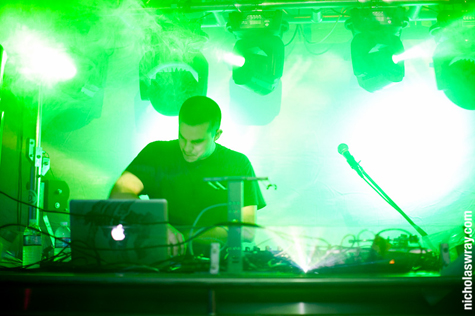
Lorn
It felt as though we were on the move at the third annual SEMF. The round robin of sets in Harlow’s, upstairs at MoMo’s, and DJ sets on the patio had me hesitant to settle in. Decisions had to be made, compromises even, but the careful selection of performers this year almost guaranteed no disappointing sets. Whatever room you occupied was the place to be at the SEMF.

Young Aundee
Jonwayne took the stage for Dibia$e’s set, to streamline raps, while Dibia$e played selector, mutating his beats with glitch takes, warping from track to track without throwing off his rapping amigo in flip-flops. The set bled into Jonwayne’s slot, as he returned the mic to the stand, plugged in his beat machine and rattled the walls with menacing cuts that blended Southern trap rap bravado like Rick Ross’ proclaiming, “I’m treated like a king when I’m dining,” with boss level 8-bit beats and the baritone keys of a grand piano.

Dusty Brown
The Low Enders are the genuine article, but I found great pleasure in the discoveries, particularly Satellites. The presence of the wooden Pandora’s Box known as the Monome was a rare sight to behold, since I can only think of two other beat makers (Daedalus and Galapagoose) who are masters of its magical properties. He’s impossible to Google, so I still know jack shit about him. But Satellites’ push-button magic set an introductory tone for the L.A. vibes that followed.
Local performers like Paper Pistols, Doom Bird and Dusty Brown instilled the 916 pride in our festival. My hope is that the out-of-towners lurked around for the Dusty Brown set and that word will spread regarding our secret weapon. Dusty Brown opened with the unveiling of two new songs before delivering cuts from his concise and captivating This City Is Killing Me EP, which is destined to be a local classic. Opening with unfamiliar material reeled me in. It’s a dangerous move, but the group is justified in its confidence in their new music. I’m more than ready for a new Dusty Brown album.
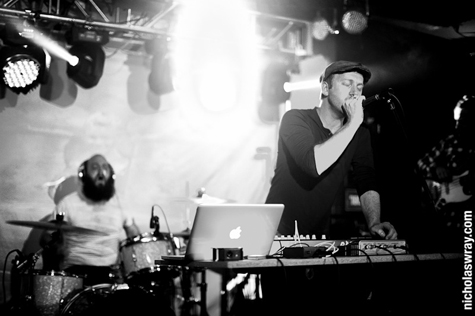
Paper Pistols
Renown Sacramento Producer Raleigh Moncrief Steps Out from Behind the Boards for His New Solo Album
A fine piece of apothegm to live by is, “you’re only as good as the company you keep.” Look at Ringo Starr. He got by with a little help from his friends, who happened to be the greatest musical minds of his time. A relevant and localized example is producer Raleigh Moncrief, who’s collaborated with Zach Hill, toured in Marnie Stern’s band and co-produced/engineered one of the most unanimously lauded albums on a national scale in the past two years.
If he lived in Brooklyn, he would get accosted by hipster vermin at every DIY show he attended. Living in Sacramento means relative anonymity, even indifference to an extent, which allows unlimited hideout time to craft a solo record while producing for the budding local bands. A hermit’s life is how creative-types get things done, and for Moncrief it means recording in his kitchen with an acoustic guitar and laptop at odd hours between sessions with Ganglians and Teddy Briggs of Appetite.
Moncrief is one of the few “behind-the-scenes” guys that has his name shouted out in press releases and in print. Contributing to Dirty Projectors’ Bitte Orca record plays a significant role in that, but this year alone he’s recorded a Ganglians record, the Appetite record and an EP with Cuckoo Chaos–those are just the ones released. Last year he sporadically released free digital beat tape EPs and remixed a few local rap artists. Without hearing Moncrief’s solo debut Watered Lawn, one might assume he’s scatterbrained or has A.D.H.D. when it comes to music, but over the phone he cleared the air with, “I like to work fast and get it out of my face or my mind.”
Listening to the advance of the Anticon debut, the many faces of Moncrief begin to blur. Even my iTunes player struggled with defining Watered Lawn, by anointing it “New Age”–the dishwater of music genres. When I shared this curiosity with Moncrief, he replied through laughter, “How the fuck did that happen?”
Defining Moncrief’s music can be quizzical; a task he sidestepped by casually stating, “That’s not my job,” but the record is not beyond comprehension. The title itself suggests a project well tended and cared for, which is properly delivered in the 38-minute duration. Written in the three-month span of December through March, Watered Lawn is the amalgamation of Moncrief’s flighty interests in mainstream hip-hop production, a bit of leftover 8-bit intrigue and his various indie collaborations whittled down into 11 songs. Last year’s Carpal Tunnels beat tape introduced Moncrief as a hip-hop producer, but as time wore on the sound began leaning toward chillwave and beat music associated with the Los Angeles scene. In our interview, he offered a slightly alternative progression.
“In my mind I owe more to mainstream hip-hop,” he said. “It’s kind of weird because I don’t really listen to that beat music so much. There are elements of it I really like. It’s really about the low end. That’s something I took away from that [scene]. But I think that T.I. was more inspiring than the beat scene.”
By March he leaked “Lament for Morning” to the blogs, which ushered in the first glimpse of a newly discovered identity. The track made sense in fluidity of past work, but the release of “I Just Saw” in late August broke his vocal silence and hinted at a friendly influence. On the track, Moncrief is twitterpated by a female vision, stretched to a joy of singing without concern to his voice’s limitations. It is a singing style often attributed to David Longstreth of Dirty Projectors.
“I can’t help but be influenced by everyone I’ve worked with,” Moncrief said. “The main thing I took away specifically from working with Dave was exploring those outer limits. Being someone who’s not afraid to go to a place that is uncomfortable for yourself. Being brave and having the courage to try something that you’re not going to be confident in is valuable.”
Tracing back to his days in instrumental post-rock bands What’s Up? and Who’s Your Favorite Son, God?, Moncrief was the silent axe man, which continued into his project with Zach Hill and playing alongside Marnie Stern. While recording his debut he described the urge to sing as something growing in his mind, a new challenge to go along with his newly discovered production style. “I’ve written things and had other people sing them,” he said. “It reached a point where it felt like doing it myself was something I needed to prove I was capable of.”
“Lament for Morning” was the first leak, but the track that was his breakthrough was “Cast Out for Days,” which achieves a balance of the organic instruments (guitar and vocals) alongside warping glitches, flickering synths and programmed drums. “To me, [“Lament for Morning”] still sticks out like a sore thumb on the record,” he said. “Originally it was a guitar piece that was instrumental, but I didn’t know if it fit. So I just changed the guitar parts to vocals. That was my vain attempt at making it fit contextually.”
With new discovery can come bothersome uncertainty, but relating back to ol’ Ringo, one gets by with help from their friends. Moncrief had his share of butterflies. He sent his music out to the hodge-podge of contacts and friends he accumulated in the industry, including label heads at Anticon who initially balked at his beats. “I’d send them out to friends and say, ‘How does this make you feel?’
“I was looking for reinforcement because when you’re isolated like that it’s hard to have perspective,” he said. “Which is something good about the isolation as well. I got a lot of good feedback that helped build confidence in pursuing the change, because it’s a pretty big departure from most everything I’ve done previous.”
Oddly enough, it took a blog post instead of a personal e-mail to get Anticon’s attention. The label head contacted Moncrief and offered him a record deal. The label even sent Watered Lawn to Los Angeles to be mastered by Daddy Kev, owner of Alpha Pup Records and founder of Low End Theory, a weekly club night featuring experimental hip-hop–ask any Low End theorist or resident and they’ll say it’s an honor to receive his visionary stamp of approval. Raleigh could only say in approval, “He made it loud. Good work, Daddy Kev.”
The record awaits an Oct. 25 release date, but Moncrief is not taking a breather from issuing personal challenges. He has a few California tour dates, mostly coastal, scheduled sooner than he’d probably prefer. It will be his first opportunity to debut his songs, as well as perform with a four-piece band, which was lacking completion at the time of our interview. “It’s short notice,” he said. “It’s coming together well, but there’s still a lot to be done before I’d feel confident performing, which is funny because I think there’s a show in two weeks? Three weeks?”
As sketchy as he said he felt, it also seemed as though the pieces would fall into place regardless. Moncrief lamented it was tough to find people to play, but perhaps he will call in a few more friendly favors.

Look for Watered Lawns from Anticon Records on Oct. 25, 2011.
Grimey: Death Grips
Tuesday June 7, 2011
Townhouse Lounge, Sacramento, California
On Tuesday, June 7, DJ Whores booked dubstep DJs from distant lands like New York City and France. But when the downstairs cleared for an upstairs Death Grips set, for once Sacramento showed some goddamned pride.
Death Grips bears the rumblings of a strange new era for hip-hop–if the genre is even appropriate. Between Death Grips and the teenage riot of Los Angeles’ Odd Future Wolf Gang Kill Them All (OFWGKTA) crew, hip-hop seems to be embracing a DIY and punk mentality that hasn’t been prevalent in the genre since Fab Five Freddie was kicking it with Debbie Harry in the Lower East Side. Devoid of heavy-handed derivatives, Death Grips respectfully appeals to Sacramento and the indie world-at-large’s iTunes playlist without losing an ounce of visceral gnarl. The Ex-Military mixtape is the group’s call to arms through heavy bass warbles, juke break beats and vintage psych-samples from Link Wray and The Castaways. Critics jumped the gun when they hailed New York-based MC Waka Flocka Flame as the first metal god of rap. No one could have predicted Death Grips’ Stefan Burnett, a Kimbo Slice-looking dude from Oak Park, was lurking in the trenches with a deeper-seated metal intent with lyrics, “Dismiss this life/Worship death/Cold blood night of serpent’s breath/Exhaled like spells from the endlessness/In the bottomless wells of emptiness,” over the thunder of Zach Hill’s drums.
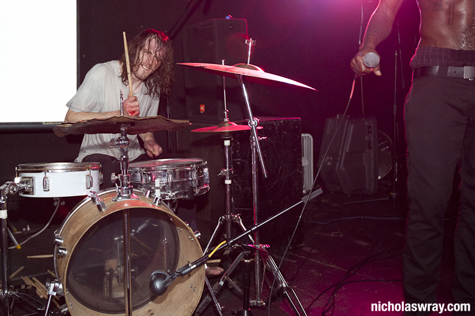
The Sunday prior to the Grimey set, Death Grips played a secret show at Press Club, a set that made its way to YouTube in record time. The Grimey announcement was as last-minute as it gets, with most of the curious anticipating a Davis house show as the unveiling of the mysterious Zach Hill project. The cloak was off entirely, as was frontman Stefan Burnett’s shirt as he stalked the stage, like any moment he might snap and start cracking skulls. No one was injured during the set, nor did a full-on mosh pit ever break out. The surprise was the rush to be on top of Death Grips without taking the stage–an instant embrace virtually unheard of for a local act. Burnett’s coined grunt of “Yuh” was mimicked on cue and other times in brief quiet moments, affirming his bark as the group’s battle cry. Sacramento is excited for its locally raised rap beast–enough to shed the cool, shed the cynicism, shed the apathy and get buck for 40 minutes in ToHo. It caught me off guard so much that I’m reluctant to mention it for fear it might backfire and curse the unabashed enthusiasm.

Whether we sustain our buzz in the home front or not, Death Grips is in takeover mode with or without us. This week (June 15), the group performs L.A.’s Low End Theory, a weekly melding of art and music held every Wednesday at The Airliner, a stage that made the careers of DJ Gaslamp Killer and producer/musician Flying Lotus. In the end, if Death Grips maintains an indifference to hype present within the music, it will always have a home in Sacramento. The nihilistic candor on tracks like “I Want It I Need It (Death Heated)” and “Spread Eagle Across the Block” boasts a lifestyle prevalent in Midtown yet to be captured sonically. I, for one, hope this is the beginning of many voice-shot nights shouting “Yuh” to come.



